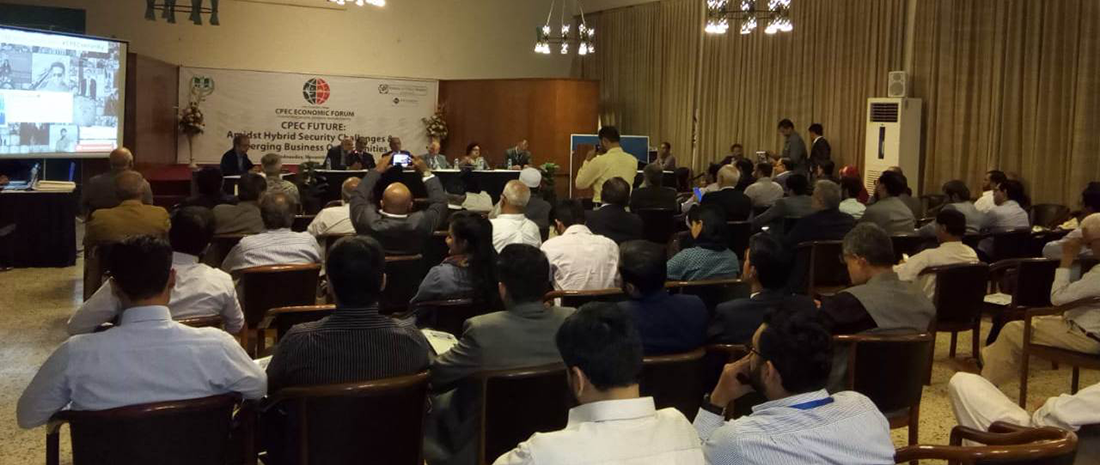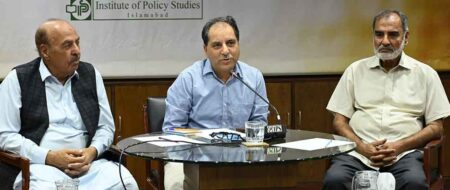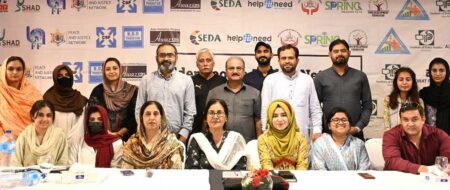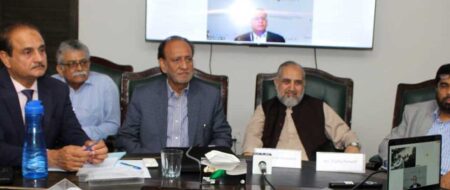CPEC Future: Amidst Hybrid Security Challenges & Emerging Business Opportunities
Hybrid security challenges a pitfall for CPEC prospects: Experts
Urging everyone to understand the challenges CPEC was faced with amidst hybrid security threats, socio-economic experts urged the countrymen to identify and fulfil their individual and collective responsibilities not only to secure the corridor’s future, but also to extract the most out of its potential.
They were speaking at a seminar titled ‘CPEC Future: Amidst Hybrid Security Challenges & Emerging Business Opportunities’, which was jointly organized by CPEC Economic Forum, Institute of Policy Studies (IPS), Islamabad, and Pakistan Institute of Management’s (PIM) Centre of Excellence at the PIM’s premises in Karachi on November 28, 2018.
The session was addressed by Ambassador (retd.) Munir Akram, Pakistan’s former permanent representative to the United Nations, Rasulov Sadullo Shukurboevich, HoD, Institute for Strategic and Regional Studies, Uzbekistan, DG-IPS Khalid Rahman, Dr Juniad Ahmad, founding chairman, National Management Consultants, Dr Shahida Wizarat, dean College of Economics & Social Development, IOBM, Abid Sabri, executive director, Pakistan Institute of Management, and Arshad Qaim Khani, executive chairman, CPEC Economic Forum.
Amb (retd.) Munir Akram, in his keynote speech, said that China had progressed more rapidly than any other country in the history of the world, and now it was giving opportunities to its partner countries as well to help them develop. He said that in line with CPEC objectives, China granted funds to develop a port in Pakistan which were later handed over to a Singaporean company. The onus is now on Pakistan to efficiently execute the development of the port as well as other related projects as per the devised plan in order to take advantage of its strategic positioning in the exclusive economic zone.
Talking about some of the areas that Pakistan needed to focus upon in order to benefit from CPEC proficiently, the former diplomat said that the country needs to develop its industrial sector with exigency as it was the source of 12% of the country’s revenue. He also pointed at some Chinese industries which, according to him, were going down, and hence with proper planning and execution, presented Pakistan an opportunity to take the advantage of.
DG-IPS Khalid Rahman pronounced that the ongoing propaganda against CPEC was one of many hybrid tactics being used by adversaries to undermine the project. He said that while the improved governance in Pakistan could play a key role in the project’s success, connectivity of stakeholders was also as much needed for the cause. He said that it was important for us to understand what we can achieve both in our individual as well as collective capacities, as this realization could pave way to extract the most out of the CPEC’s potential.
Rasulov presented the Uzbek perspective over CPEC, terming the project a window of opportunity not only for Pakistan, but for Uzbekistan as well. He said that the double land-locked country, which is already being reached by Russian and European counterparts, too finds CPEC very attractive, and believes that both CPEC and Uzbekistan can benefit from each other profoundly.
Dr Wazarat saw CPEC and OBOR as a prospective win-win situation for everyone, albeit ruing the mishandling of presented opportunities by the local leaders in Pakistan who ended up making many lopsided deals because of which the country had to give much more than what it had to take.
The renowned economist also lamented that US-backed affiliations were generally given more preference in Pakistan, calling it one of many areas where the country could learn from China a great deal. The speaker singled out agriculture as one of the main areas where Pakistan could benefit from China, advising that the country should target the opportunity presented by China in form of its more than $100bn import for the food products.
Dr Junaid highlighted several issues faced by the internal investors vis-à-vis CPEC projects stating that over $3bn worth of projects, which were agreed by multinational companies in past two and half years, have gone nowhere. He said that the security issue lies at the very heart of the matter, with the interventions of US directly or indirectly affecting majority of Pak-China deals.
The speaker also stressed that Pakistan needs to improve in its negotiations with China, understanding the true potential of the economics between the two countries while being very clear about where the country stands as a nation with regards to its dealing with the US and China.
Sabri stressed that the enemies of Pakistan were now becoming the enemies of CPEC as well, maintaining that the project could only be successful if the nation stays united. Suggesting many ways to counter the hybrid security threats the project was faced with, the speaker suggested to bring all stakeholders onboard in a bid to make them a part of proceedings. He even advised the men at the helm in Pakistan not to get into the debate of taking or giving the credit for CPEC, advising them to let past governments take a part of the credit as this could help a great deal in developing ownership of the project among all stakeholders.
Qaim Khani was of the view that CPEC was connecting people for peace, progress and prosperity. He however was wary that the country needed to work on the social perspective of CPEC as well. He regarded the project crucial for Pakistan terming it a national objective, while stressing that it was the country’s need to make use of opportunities emerging with CPEC, not only to stabilize its economy, but also to make up for the losses it incurred following the war on terror.












